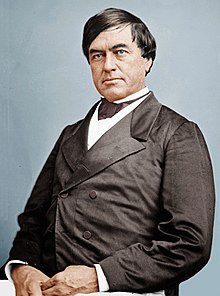Cassius Marcellus Clay
Cassius Marcellus Clay (born October 19, 1810 in Madison County , Kentucky , † July 22, 1903 there ) was an American politician and abolitionist .
Life
Cassius M. Clay studied at Yale University in Connecticut until 1832 and then worked as a lawyer in Madison County. After serving in the Kentucky House of Representatives several times between 1835 and 1840 , he appeared as a staunch opponent of slavery from 1841 under the influence of the abolitionist William Lloyd Garrison , whom he had heard during a student speech at Yale . At that time he was a member of the Whigs , at whose nomination convention for the presidential election of 1840 he had attended as a delegate.
When he founded the weekly True American in 1845 , where he spoke out against slavery, followers of slavery destroyed his print shop. He then moved to Cincinnati and published the newspaper there. He later moved the print shop to Louisville and changed the name to Examiner .
In 1846 he criticized the American invasion of Texas , which led to the Mexican-American War , but volunteered for the army and received the command of a unit as a captain , which was captured by the Mexican army . Clay and his unit were held captive at Perote Fortress until General Winfield Scott obtained their release. In several political and philosophical writings, Clay championed the radical implementation of the democratic-republican principle; he is therefore considered one of the founders of the Republican Party . Seriously wounded in a battle caused by the slave question in Kentucky, he nevertheless continued to fight slavery after his healing. Following Abraham Lincoln's election as US President , Clay was appointed US Ambassador to Russia .
In 1862 he returned to America and did a lot to urge Lincoln to take the final decisive steps against slavery , namely to issue the Emancipation Proclamation of January 1, 1863, which abolished slavery in all states. During the Civil War, Clay served as a major general (major general) in the volunteer army, but was not involved in any fighting. In March 1863 he went back to Saint Petersburg as ambassador . In 1869 he returned to Kentucky and joined the Democratic Party . Clay died in 1903 on his White Hall estate and was buried in Richmond .
On July 18, 2000, Clay was inducted into the Civil Rights Hall of Fame by a human rights organization in Kentucky .
Cassius M. Clay was the son of General Green Clay and the cousin of former US Secretary of State Henry Clay and the Governor of Alabama , Clement Comer Clay . He was married twice. His first marriage was in 1833 with Mary Jane Warfield, with whom he had ten children, the marriage was divorced in 1878. In 1894, at the age of 84, he married 15-year-old Dora Richardson, and this marriage also ended in divorce a few years later.
Trivia
Herman Heaton Clay, a descendant of African slaves, named his son Cassius Marcellus Clay (now known as Cassius Marcellus Clay Sr.) in honor of the abolitionist for his leadership in the abolition of slavery . This in turn named his son Cassius Marcellus Clay ( Cassius Marcellus Clay Jr. ), who later became world boxing champion and changed his name to Muhammad Ali .
Works
- Life of Cassius Marcellus Clay. Memoirs, Writings and Speeches . General Books, Memphis, Tenn. 2009, ISBN 978-1-1512-4838-1 (reprint of Cincinnati 1886 edition).
literature
- Keven McQueen: Cassius M. Clay. Freedom's Champion. The life-story of the famed Kentucky emancipationist . Turner Publ., Paducah, Ky. 2001, ISBN 1-5631-1667-7 .
- Hugh Edward Richardson: Cassius Marcellus Clay. Firebrand of Freedom . University Press, Lexington, Ky 1996, ISBN 0-8131-0861-6 (reprinted from Lexington 1976 edition).
Individual evidence
Web links
- Cassius Marcellus Clay in nndb (English)
- Cassius Marcellus Clay in the database of Find a Grave (English)
- Ambassador of the United States of America to Russia
| personal data | |
|---|---|
| SURNAME | Clay, Cassius Marcellus |
| BRIEF DESCRIPTION | American abolitionist and politician |
| DATE OF BIRTH | October 19, 1810 |
| PLACE OF BIRTH | Madison County , Kentucky |
| DATE OF DEATH | July 22, 1903 |
| Place of death | Madison County , Kentucky |
